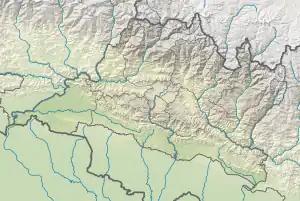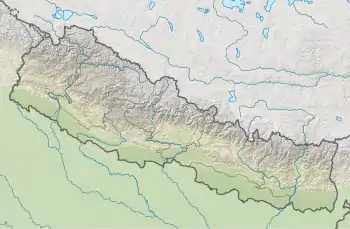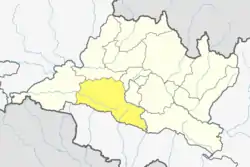Bakaiya Rural Municipality
Bakaiya is a Rural municipality located within the Makwanpur District of the Bagmati Province of Nepal. The municipality spans 393.75 square kilometres (152.03 sq mi) of area, with a total population of 39,620 according to a 2011 Nepal census.[1][2]
Bakaiya (RM)
बकैया गाउँपालिका | |
|---|---|
 Bakaiya (RM) Location  Bakaiya (RM) Bakaiya (RM) (Nepal) | |
| Coordinates: 27.333155°N 85.203175°E | |
| Country | |
| Province | Bagmati |
| District | Makwanpur |
| Wards | 12 |
| Established | 10 March 2017 |
| Government | |
| • Type | Rural Council |
| • Chairperson | Mr. Damodar Khanal |
| • Vice-chairperson | Mrs. Sarla Bolkhe |
| Area | |
| • Total | 393.75 km2 (152.03 sq mi) |
| Population (2011) | |
| • Total | 39,620 |
| • Density | 100/km2 (260/sq mi) |
| Time zone | UTC+5:45 (Nepal Standard Time) |
| Headquarter | Chhatiwan |
| Website | bakaiyamun |
On March 10, 2017, the Government of Nepal restructured the local level bodies into 753 new local level structures.[3][4] The previous Dhimal, Chhatiwan, Shikharpur, Manthali and Thingan VDCs were merged to form Bakaiya Rural Municipality. Bakaiya is divided into 12 wards, with Chhatiwan declared the administrative center of the rural municipality.
Demographics
At the time of the 2011 Nepal census, Bakaiya Rural Municipality had a population of 39,642. Of these, 73.1% spoke Tamang, 25.4% Nepali, 0.5% Magar, 0.3% Bhojpuri, 0.3% Rai, 0.2% Maithili, 0.1% Newar and 0.1% other languages as their first language.[5]
In terms of ethnicity/caste, 73.3% were Tamang, 6.0% Hill Brahmin, 5.8% Chhetri, 3.3% Majhi, 3.0% Kami, 2.1% Rai, 1.4% Magar, 1.1% Danuwar, 1.1% Ghale, 0.4% Damai/Dholi, 0.4% Newar, 0.3% other Dalit, 0.3% Gurung, 0.3% Terai Brahmin, 0.2% Sunuwar, 0.1% Brahmu/Baramo, 0.1% Kalwar, 0.1% Kathabaniyan, 0.1% Pahari, 0.1% Yadav and 0.3% others.[6]
In terms of religion, 72.8% were Buddhist, 25.7% Hindu, 1.2% Christian and 0.3% others.[7]
In terms of literacy, 56.3% could read and write, 3.1% could only read and 40.6% could neither read nor write.[8]
References
- "District Corrected Last for RAJAPATRA" (PDF). www.mofald.gov.np. Retrieved 17 July 2018.
- "स्थानीय तहहरुको विवरण" [Details of the local level bodies]. www.mofald.gov.np/en (in Nepali). Ministry of Federal Affairs and Local Development. Archived from the original on 27 March 2019. Retrieved 17 July 2018.
- "New local level structure comes into effect from today". The Himalayan Times. Nepal. 10 March 2017. Retrieved 17 July 2018.
- "New local level units come into existence". The Kathmandu Post. 11 March 2017. Retrieved 18 July 2018.
- NepalMap Language
- NepalMap Caste
- NepalMap Religion
- NepalMap Literacy
